Women around the world celebrated November 25 as the International Day for the Elimination of Violence Against Women by taking out protest rallies and marches. We take this opportunity to remember the three Mirabal sisters — Patria, Minerva, and María Teresa Mirabal, popularly known as “the butterfly sisters”. The date November 25 was chosen to pay homage to the “the butterfly sisters” who were murdered in the course of their heroic efforts to overthrow the brutal dictatorial regime of Leónidas Trujillo in the Dominican Republic.
The following article is a compilation from a number of sources, links to which are provided in the end.
The United Nations General Assembly has designated November 25 as the International Day for the Elimination of Violence Against Women (Resolution 54/134). Violence against women and girls happens to be one of the most widespread, persistent and devastating human rights violations in our world today, and remains largely unreported due to the impunity, silence, stigma and shame that often surround it. In According to the United Nations, in 2017 alone, approximately 87,000 women and girls were murdered around the world.
This year and for the following two years, the UN’s campaign, to prevent and eliminate violence against women and girls, will focus on the issue of rape as a specific form of violence committed against women and girls at times of peace or war. The 2019 theme is ‘Orange the World: Generation Equality Stands Against Rape’.
Like previous years, this year’s International Day on 25th November marked the launch of 16 days of activism that will conclude on 10 December 2019, which happens to be the International Human Rights Day. Protest marches were held in many countries across Latin America, including Mexico, Chile, Argentina, Uruguay, Honduras and Sudan, to denounce violence against women. Large protests were also held in cities across Europe in France, Italy, Turkey and Spain.
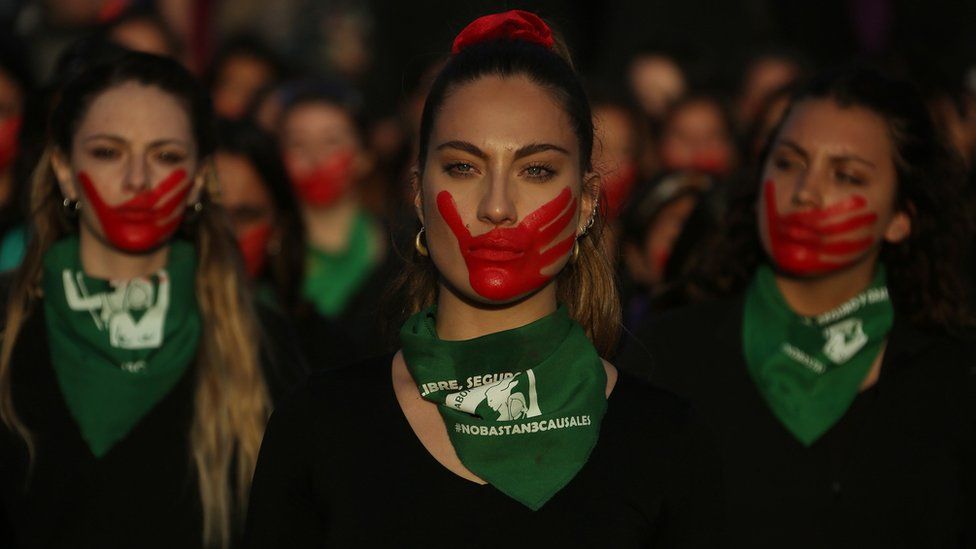
In Chile, demonstrators marched with red hands painted over their mouths as they called for more action.
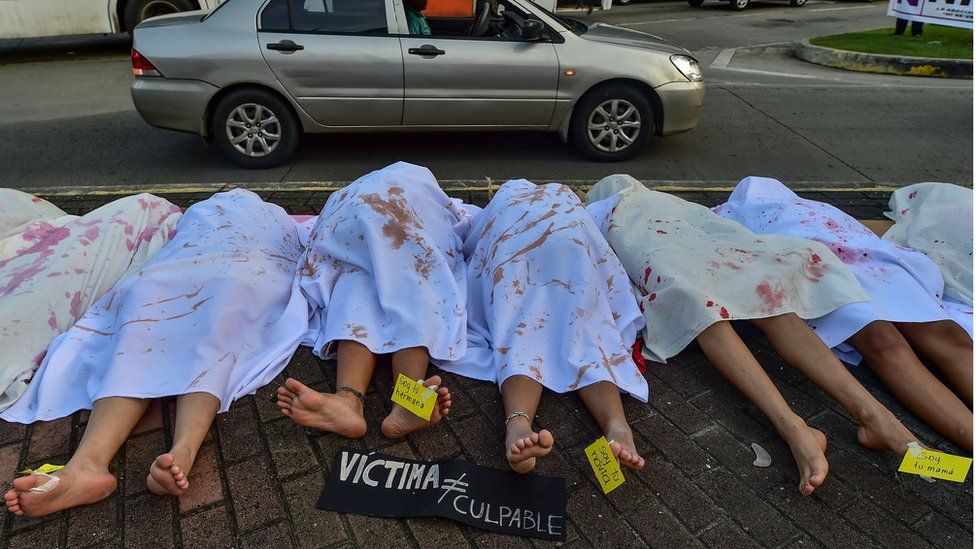
In Panama City, women lay under sheets covered in fake blood to represent those killed as a result of femicide.
Significance of the November 25 date
In 1981, the first Latin American and Caribbean Feminist Conference was held in Bogotá, Colombia. There, it was proposed to establish November 25 as the International Day for the Elimination of Violence against Women. Years later, in 1999, the General Assembly of the United Nations voted for November 25 to be recognized as the day of the Elimination of Violence against Women.
The date of November 25 was chosen to pay homage to and remember the heroic efforts of the three Mirabal sisters — Patria, Minerva, and María Teresa Mirabal. Popularly known as “the butterfly sisters” (Las Mariposas), the Mirabal sisters fought to overthrow the brutal dictatorial regime of Rafael Leónidas Trujillo in the Dominican Republic.
Trujillo’s regime and The Mirabal sisters’ rebellion
Rafael Leónidas Trujillo, US Marine trained soldier, seized control of the Dominican Republic in May, 1930. He assumed power by means of a rigged presidential election in which the number of ballots announced in favour of Trujillo exceeded the number of eligible voters in the country. Through civil intimidation and political assassinations he quickly constructed one of the most brutal dictatorships of the twentieth century.
The 31 years of Trujillo’s rule (1930-1961) were characterized by the severe repression of labor and trade union movements, of Leftist and youth organizations, and of his political opponents and dissidents. Trujillo ruled with an absolute disregard for democratic rights. His regime tolerated no effective opposition, no free press, no free speech. Opponents were repressed by terroristic methods. It is estimated that his regime brought about the death of more than fifty thousand Dominicans and thousands of Haitians who were specific targets in the killings on October 1937, now referred to as the “Parsley Massacre.”
The Mirabal Sisters ignited a grassroots coalition composed of men and women which educated the public and exposed Rafael Trujillo’s regime. In 1959, the sisters helped form an underground political group, Movimiento 14 de Junio/The Movement of the Fourteenth of June, with the explicit goals of defending democracy and freedom. They, along with other men and women comrades, worked and campaigned to overthrow Trujillo’s government. They held meetings in each other’s houses, always on the lookout for the secret police. They even stopped using their real names and used code names instead. The sisters were called Las Mariposas—The Butterflies—and gained immense reputation as warriors committed to the cause defending democracy and human rights within their country.
Despite their caution, the Las Mariposas’ rebel group was discovered, and many of the members were thrown in prison, including the sisters and their husbands. In 1960, they and their group bore the brunt of political suppression and Trujillo’s campaign of terror. The Mirabal sisters, along with their husbands, were detained on several occasions, tortured in clandestine prison sites and raped by Trujillo’s soldiers.
Mirabal sisters were released from prison on parole but their husbands were not released. Trujillo suspected the sisters’ larger involvement in the conspiracy to oust him. He moved María Teresa’s and Minerva’s husband to Puerto Plata prison in a far off mountainous region and with his secret police hatched a ploy to kill the sisters.
On November 25, 1960, Patria, Minerva, and Maria Teresa went to see their husbands at the Puerto Plata prison. Trujillo’s secret police had laid a trap for the women. While returning home from the prison while crossing a bridge they found their way blocked by Trujillo’s secret police. The women were dragged out from their car and taken to a nearby sugar cane field, where they were clubbed and strangled to death. The driver of the car was killed as well. The secret police then put their bodies back in the car and pushed it off the mountain to make the deaths look like an accident.
A message arrived for their sister, Dedé, that said, her three sisters were dead—the Butterflies had flown free of this life.
The kidnapping and murder of Mirabal sisters happened to be one of the most outrageous of the crimes committed during Trujillo’s lengthy dictatorship. It was the most widely reviled, of the countless crimes committed by his regime. The killing sparked a strong sense of indignation among Dominicans and mobilized international censure of his regime.Six months later, on May 30, 1961, Trujillo was assassinated in San Cristobal.
The death of the Mirabal sisters had a great impact on Dominican society, though it had not been officially acknowledged until the 1990s, when the country recognized Patria Mercede, Minerva Argentina and Antonia Maria Teresa as national martyrs, and incorporated them in history lessons. Minerva, Patria, and Maria Teresa became symbols of activism and feminist resistance worldwide. The fourth sister, Dede, continued to live till 2014, when she died at the age of 88.
Solidarity with the ‘Butterflies’ of today
Today when the right-wing politics has consolidated itself globally, the Mirabal sisters need to be remembered because they stood up against the oppression of the state. It is equally important to remember that while individual cases of violence against women and girls by family members and, intimate partners and such have to be fought against, the question of gendered violence cannot simply be reduced to only individualized cases. Violence, particularly against women and girls and torture including rape, remains an important aspect of the states policies that women worldwide confront every day. Both – the individualized and the state violence – must be fought against concurrently.
Yet, unfortunately, even as November 25 is being commemorated, the fact that the Mirabal sisters were killed fighting a dictatorial state, is often erased out of public memory. This is the risk we often run when certain days, like November 25, are institutionalized, and appropriated by the states who themselves are the worst violators of human rights.
The Trujillos of the past will seem insignificant when compared in magnitude to the oppression and violence on all marginalized communities, particularly women and children who suffer the most, unleashed by the likes of present fascist rulers – Modi, Trump, Putin, Erdogan and others. But the warrior spirits of the Mirabal sisters of today still haunt these tyrant rulers and their despotic puppet regimes. From Kashmir to Rojava to Palestine’s liberation struggles, in the rebellious streets of Ecuador to Chile to Lebanon, from fights to change the system in Hong Kong to Iraq to Haiti and elsewhere, women and girls are in the forefront to build a better fair and just world. Only through active solidarity with these resistance movements against the oppressive states, can we remember and pay homage to their memory.
Today we must rise up and participate in the fight against gender violence in honor of the legacy of the ‘Butterflies’. As the daughter of one of the murdered butterfly sisters wrote “If they kill me I shall reach my arms out of the grave and I shall be stronger.”
Sources and links from which the above article has been compiled and images taken
https://www.un.org/en/events/endviolenceday/
https://en.wikipedia.org/wiki/
https://www.bbc.com/news/world-50557784

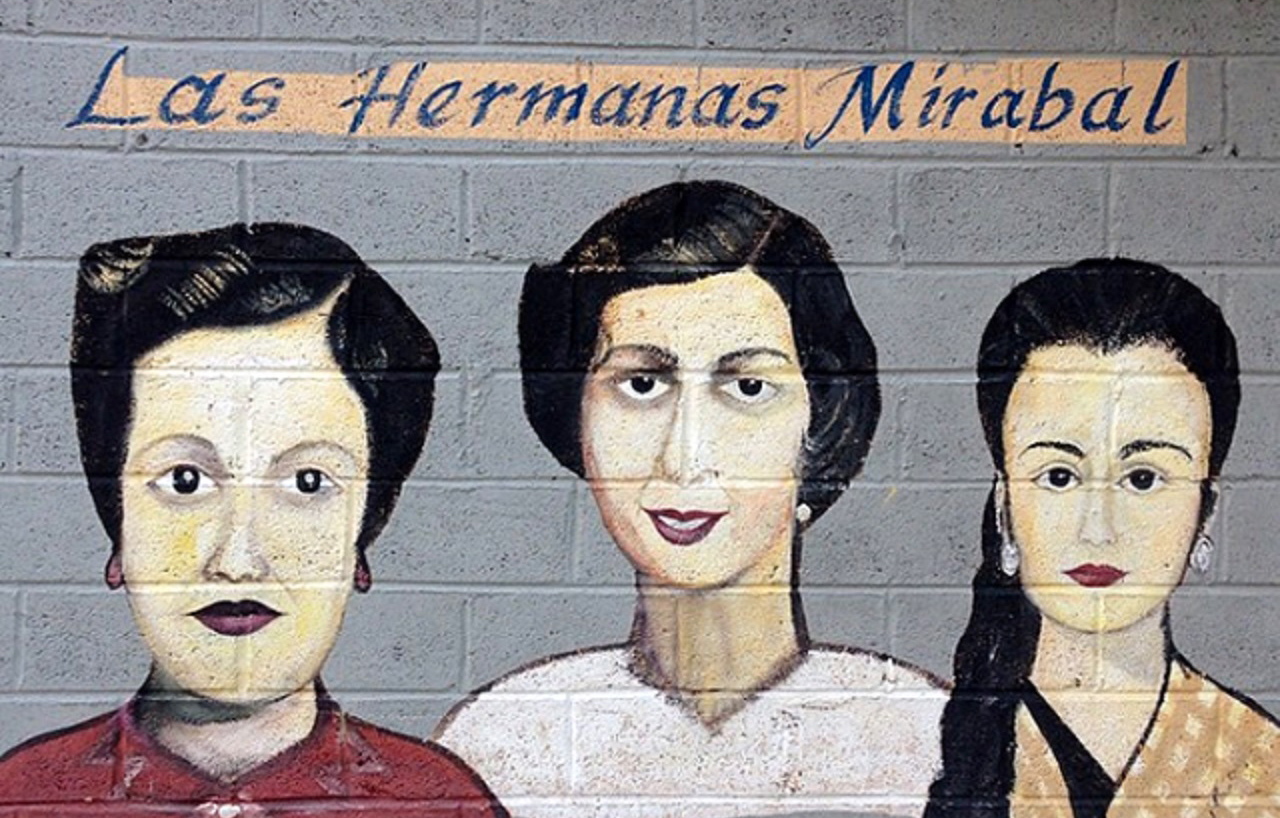
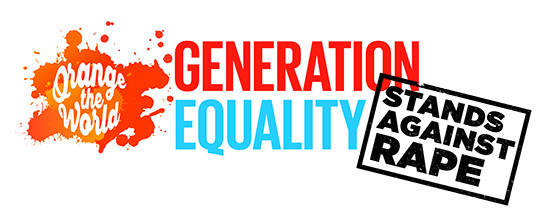
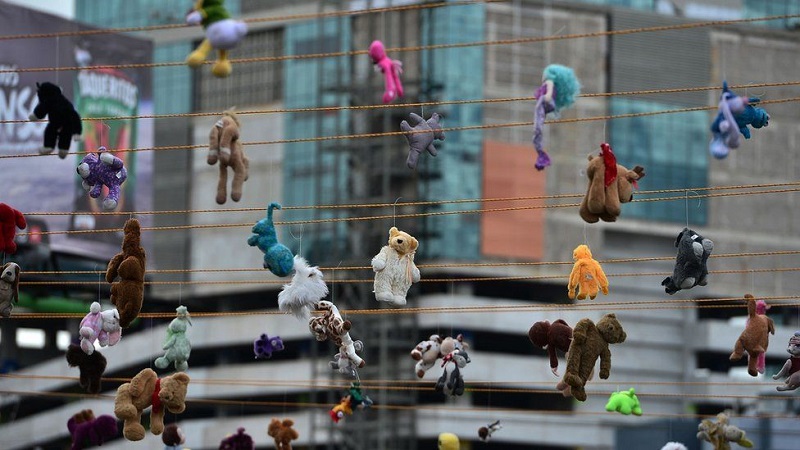
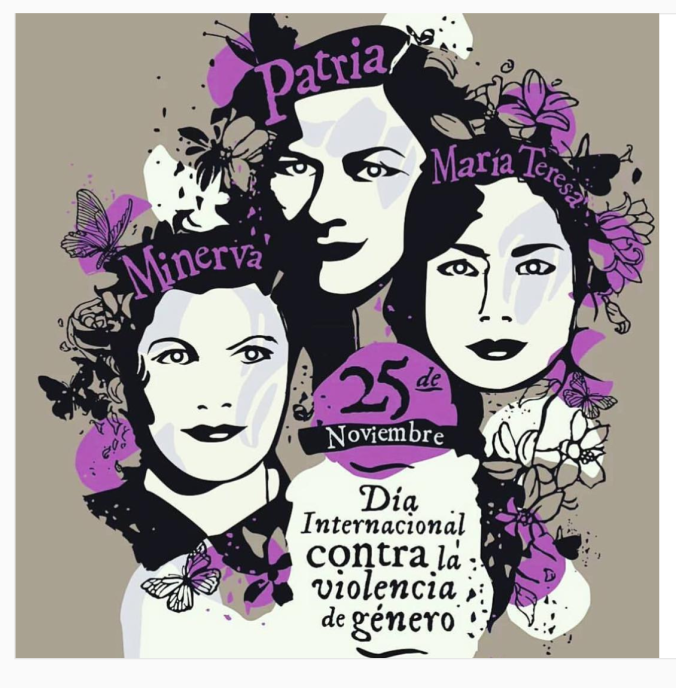

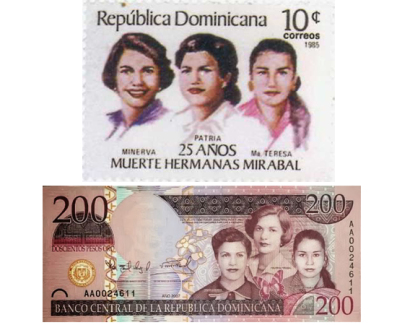

[…] SOURCE: https://www.groundxero.in/2019/11/29/remembering-las-mariposas-the-butterfly-sisters/ […]